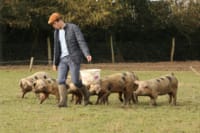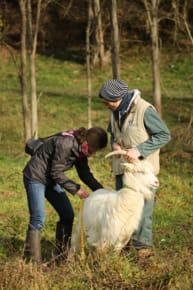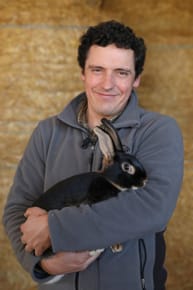Libourne, 28 February 2019– At the International Agricultural Show in Paris, under the patronage of the Ministry of Agriculture, Ceva Santé Animale and the Fondation du Patrimoine presented the “Fondation du Patrimoine National Animal Agrobiodiversity Prize”. The prize honoured two breeders and one organization for their commitment to preserving and promoting rare local agricultural breeds that represent unique genetic heritage:
- 1st prize of €10,000 for the Bayeux pig (Calvados)
- 2nd prize of €6,000 for the Pyrenean goat (Ariège)
- 3rd price of €4,000 for the Lapin-Chèvre rabbit (Vendée)
Preserving animal biodiversity to save rural agriculture
According to a recent report by the Food and Agriculture Organization of the United Nations (FAO), world animal production relies on approximately 40 species, with only a handful providing the majority of meat, milk and eggs. Out of the 7,745 livestock breeds registered by country worldwide, 26% are endangered.1 In France, over 80% of local breeds (all species) are considered at risk of being lost.2
In this context, more than ever before, animal biodiversity conservation has become a top priority in preserving the identity of our local regions, our genetic capital and rural agricultural potential. The FAO report emphasizes the general need for heightened awareness: 80% of the 91 reporting countries indicated that they use one or several biodiversity-friendly practices or approaches, such as organic agriculture or conservation agriculture.
The National Animal Agrobiodiversity Prize, founded by Ceva Santé Animale and the Fondation du Patrimoine, supported by a private sponsor, illustrates a common vision for promoting biodiversity through a viable economic project rooted in its territory. Under the patronage of the French Ministry of Agriculture, the prize honours original efforts aimed at preserving and promoting rare French domestic agricultural breeds that represent unique genetic heritage: cattle, goats, equines, swine, working dogs, poultry and other farm animals.
The selection board chose winners based on three major criteria: the project’s economic dimension, its social and environmental impact in the given territory, and the steps to increase public awareness and communication around a rare breed.
"As the number one French veterinary biopharmaceutical company, Ceva is working to support all forms of agriculture and thus contribute to preserving agrobiodiversity. We are committed to rewarding the work of livestock owners who promote sustainable agriculture and animal biodiversity. Once again, this year, the wealth of projects and enthusiasm of the participants enabled us to highlight exceptional local breeds whose conservation contributes to preserving our ecosystems, territories and genetic heritage,” commented Dr. Marc Prikazsky, Chairman & CEO of Ceva Santé Animale.
“The purpose of the Fondation du Patrimoine is to preserve both built heritage and natural heritage. We should not pit nature against culture or biodiversity against human activities. Our local agricultural breeds have shaped the landscapes of our countryside and are still preserving them today. They are rich with a unique genetic heritage. Through this prize, we are proud to support breeders who preserve this living heritage that belongs to us all,” Célia Verot, Managing Director of the Fondation du Patrimoine.
1st PRIZE: BAYEUX PIG NORMANDY - Calvados
Endowment: 10 000 €
Project leaders: Antony and Muriel Angée, livestock farmers
City: 14130 Coquainvilliers
The Bayeux pig originated from a 19th century cross between Norman and Berkshire pigs (black English pigs with white feet and snouts). After being overconsumed during World War II, the breed declined rapidly before becoming nearly extinct after the Normandy landings in 1944. A conservation programme was launched in 1984. Although numbers remain few, the breed is slowly gaining ground. The Bayeux pig provides high-quality firm, dense, marbled meat that is famous in Norman cuisine and very popular for making deli meats
The selection board was won over by Antony and Muriel Angée’s project aimed at developing a rare breed in its region of origin using “family-style”, “natural" outdoor farming methods over a long time frame of 18 months (as opposed to 5 to 6 months in most intensive livestock operations). Another benefit: Antony and Muriel process all the products themselves. They sell a wide variety of meat and deli meats at the farm and at the local market in Lisieux. The selection board was also impressed by their communication about the breed, particularly through regular participation at regional fairs and celebrations and visits to their farm.
2nd PRIZE: PYRENEAN GOAT OCCITANIE - Ariège
Endowment: 6 000 €
Project leader: Association for the Preservation of Pyrenean Goats
City: 09000 Foix
The Pyrenean goat, a very old French breed that nearly became extinct in the 1980s, is of little interest to the conventional agriculture world, but is particularly well-suited to improving natural mountainous areas, including declining areas featuring vegetation little consumed by cattle and sheep (brambles, invasive shrubs, woody regrowth, etc.). The goats maintained in these environments are used to produce high quality products (artisan cheeses, meat from kids raised on their mothers' milk). The association has been working to conserve the Pyrenean goat breed since 2004 through genetic management, communication on how to raise them and regular contact with breeders. It has therefore shown positive results in improving the number of animals and breeders. The selection board is pleased to reward this association that has been long carrying out numerous efforts to promote this endangered breed.
3rd PRIZE: LAPIN-CHÈVRE RABBIT
Endowment: 4 000 €
Project leader: Baptiste Vivinus, livestock farmer
City: 85200 Fontaines
The Lapin-Chèvre rabbit is a very old farm rabbit breed, for which the standards were only defined in 2004. It originated in Nouvelle-Aquitaine, specifically in the province of Saintonge. The Lapin-Chèvre is known for the high-quality of its meat and its very rustic fur.
Rabbit meat is currently produced in a very “industrial” setting. Few breeders have dared to invest in the “natural” methods, despite consumer demand. Baptiste Vivinus, however, decided to pursue quality in this area. The selection board particularly appreciated several aspects of this, including the conservation of a very rare breed of rabbit in the context of a real economic project, the “organic farming” approach in raising the rabbits and the emphasis on the meat’s gourmet quality
1 « The state of the world’s biodiversity for food and agriculture », FA0, 02-2019
2 Bovin, ovin, caprin, porc, cheval, âne, poule, dinde, oie, canard - Source : INRA, Étude ‘Races menacées’, 11-2014
Members of the 2018 Selection Board
Chairman:
Professor Bernard Denis, Associate professor of animal husbandry, former professor at Nantes National Veterinary School, president of the Société d'Ethnozootechnie and member of the Academy of Agriculture.
Members:
- Jean-Paul Amat, national delegate for natural heritage for the Fondation du Patrimoine;
- Dr Arnaud Bourgeois, member of the Société d’Ethnozootechnie, veterinary doctor, breeder and owner of a conservation farm that raises rare breeds;
- Philippe-Jacques Dubois, ornithologist, ecologist, naturalist author, Director of Éditions Delachaux and Niestlé (Lamartinière Group), member of the Société d’Ethnozootechnie, specialist in endangered domestic animal breeds, member of the National Natural Heritage programme of the Fondation du Patrimoine;
- Delphine Duclos, Institut de l'Élevage, Project Leader for genetic resources-monitoring of rare cattle breeds- Cryobanque Nationale–population management tools;
- Jean-Olivier Le Gal, Head of the genetics mission for monogastric animals and the institutional monitoring of genetics measures for the Ministry of Agriculture;
- Dr Marc Prikazsky, veterinary doctor, CEO of Ceva Santé Animale Group;
- Emmanuel Ribaucourt, member of the Société d’Ethnozootechnie and member of the National Natural Heritage Programme of the Fondation du Patrimoine.
- End-

 Corporate Website
Corporate Website
 Africa
Africa
 Argentina
Argentina
 Asia
Asia
 Australia
Australia
 Belgium
Belgium
 Brazil
Brazil
 Bulgaria
Bulgaria
 Canada (EN)
Canada (EN)
 Chile
Chile
 China
China
 Colombia
Colombia
 Denmark
Denmark
 Egypt
Egypt
 France
France
 Germany
Germany
 Greece
Greece
 Hungary
Hungary
 Indonesia
Indonesia
 Italia
Italia
 India
India
 Japan
Japan
 Korea
Korea
 Malaysia
Malaysia
 Mexico
Mexico
 Middle East
Middle East
 Netherlands
Netherlands
 Peru
Peru
 Philippines
Philippines
 Poland
Poland
 Portugal
Portugal
 Romania
Romania
 Russia
Russia
 South Africa
South Africa
 Spain
Spain
 Sweden
Sweden
 Thailand
Thailand
 Tunisia
Tunisia
 Turkey
Turkey
 Ukraine
Ukraine
 United Kingdom
United Kingdom
 USA
USA
 Vietnam
Vietnam



